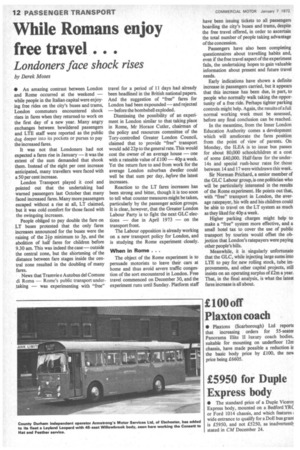While Romans enjoy free travel . . .
Page 14

If you've noticed an error in this article please click here to report it so we can fix it.
Londoners face shock rises
by Derek Moses
• An amazing contrast between London and Rome occurred at the weekend — while people in the Italian capital were enjoying free rides on the city's buses and trams, London commuters encountered shock rises in fares when they returned to work on the first day of a new year. Many angry exchanges between bewildered passengers and LTE staff were reported as the public dug deeper into its pockets or purses to pay the increased fares.
It was not that Londoners had not expected a fares rise in January — it was the extent of the sum demanded that shook them. Instead of the eight per cent increase anticipated, many travellers were faced with a 50 per cent increase.
London Transport played it cool and pointed out that the undertaking had warned passengers last October that many faced increased fares. Many more passengers escaped without a rise at all, LT claimed, but it was cold comfort for those faced with the swingeing increases.
People obliged to pay double the fare on LT buses protested that the only fares increases announced for the buses were the raising of the 21p minimum to 3p, and the abolition of half fares for children before 9.30 am. This was indeed the case—outside the central zone, but the shortening of the distance between fare stages inside the central zone resulted in the doubling of many fares.
News that Tramvie e Autobus del Comune di Roma — Rome's public transport undertaking — was experimenting with "free" travel for a period of 11 days had already been headlined in the British national papers. And the suggestion of "free" fares for London had been expounded and rejected — before the bombshell exploded.
Dismissing the possibility of an experiment in London similar to that taking place in Rome, Mr Horace Cutler, chairman of the policy and resources committee of the Tory-controlled Greater London Council, claimed that to provide "free" transport would add 22p to the general rate. This would cost the owner of an average house — one with a rateable value of £100 — 40p a week. Yet the return fare to and from work for the average London suburban dweller could well be that sum per day, before the latest increases.
Reaction to the LT fares increases has been strong and bitter, though it is too soon to tell what counter measures might be taken, particularly by the passenger action groups. It is clear, however, that the Greater London Labour Party is to fight the next GLC elections — due in April 1973 — on the transport front.
The Labour opposition is already working on a new transport policy for London, and is studying the Rome experiment closely.
When in Rome . . .
The object of the Rome experiment is to persuade motorists to leave their cars at home and thus avoid severe traffic congestion of the sort encountered in London. Free travel commenced on December 30, and the experiment runs until Sunday. Platform staff have been issuing tickets to all passengers boarding the city's buses and trains, despite the free travel offered, in order to ascertain the total number of people taking advantage of the concession.
Passengers have also been completing questionnaires about travelling habits and, even if the free travel aspect of the experiment fails, the undertaking hopes to gain valuable information about present and future travel needs.
Early indications have shown a definite increase in passengers carried, but it appears that this increase has been due, in part, to people who normally walk taking the opportunity of a free ride. Perhaps tighter parking controls might help. Again, the results of a full normal working week must be assessed, before any final conclusion can be reached.
In the meantime, from the Inner London Education Authority comes a development which will ameliorate the fares position from the point of view of parents. On Monday, the ILEA is to issue bus passes for about 80,000 schoolchildren at a cost of some £40,000. Half-fares for the under14s and special rush-hour rates for those between 14 and 17 were withdrawn this week.
Sir Norman Prichard, a senior member of the GLC Labour group, is one politician who will be particularly interested in the results of the Rome experiment. He points out that, with "free" transport in London, the average ratepayer, his wife and his children could be able to travel on the LT system as much as they liked for 40p a week.
Higher parking charges might help to make a "free" system more effective, and a small hotel tax to cover the use of public transport by tourists would offset the objection that London's ratepayers were paying other people's bills.
Meanwhile, it is singularly unfortunate that the GLC, while injecting large sums into LTE to pay for new rolling stock, tube improvements, and other capital projects, still insists on an operating surplus of £2m a year. That, in the final analysis, is what the latest fares increase is all about.




















































































